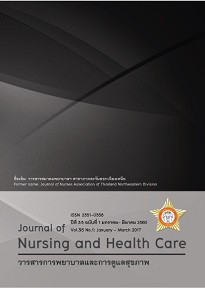การจัดการตนเองของผู้ป่วยโรคเบาหวานเพื่อป้องกันภาวะแทรกซ้อนทางไต Self-Management in preventing Diabetic Nephropathy among People with Diabetes
คำสำคัญ:
ภาวะแทรกซ้อนทางไต การจัดการตนเองการมีส่วนร่วมของชุมชน chronic kidney disease Self –management Community participateบทคัดย่อ
บทคัดย่อ
ภาวะแทรกซ้อนทางไตพบมากที่สุดในผู้ป่วยโรคเบาหวาน ซึ่งเกิดจากผู้ป่วยไม่สามารถจัดการตนเองจากปัจจัยเสี่ยงได้ โดยมีชุมชนเป็นทั้งปัจจัยเสี่ยงและแรงสนับสนุนให้ผู้ป่วยจัดการตนเอง การวิจัยนี้เป็นการวิจัยเชิงคุณภาพใช้กระบวนการวิเคราะห์ชุมชนแบบมีส่วนร่วมมุ่งศึกษาศักยภาพการจัดการตนเอง การรับรู้และความเชื่อของผู้ป่วยโรคเบาหวาน โดยผู้วิจัยเป็นผู้อำนวยความสะดวกในการจัดเวทีให้ผู้ป่วยและผู้ดูแลได้แลกเปลี่ยนประสบการณ์การจัดการตนเองเพื่อป้องกันภาวะแทรกซ้อนทางไต
การวิจัยนี้พบศักยภาพการจัดการตนเองของผู้ป่วยโรคเบาหวานในการป้องกันภาวะแทรกซ้อนทางไต 3 ลักษณะ ได้แก่ 1) ผู้ป่วยโรคเบาหวานไม่สามารถประเมินความเสี่ยงการเกิดภาวะแทรกซ้อนทางไตจากผลการตรวจ โดยเข้าใจผลประเมินระดับน้ำตาลปลายนิ้วแต่ไม่เข้าใจผลการตรวจระดับน้ำตาลสะสมรายปีและอัตราการกรองของไต จึงทำให้ไม่สามารถนำผลการตรวจมาตั้งเป้าหมายเพื่อวางแผนและนำสู่การปฏิบัติในการควบคุมระดับน้ำตาลในกระแสเลือดได้ นอกจากนั้นยังไม่สามารถจัดการควบคุมสัมผัสควันบุหรี่และการจัดการเกี่ยวกับการรับประทานอาหารเค็ม 2) ผู้ป่วยและชุมชนรับรู้ว่าผู้ป่วยโรคเบาหวานมีโอกาสมีภาวะแทรกซ้อนทางไตแต่เกิดช้าหรือเร็วแตกต่างกันไปเนื่องจากการปฏิบัติตัวต่างกัน โดยระบุว่า การควบคุมระดับน้ำตาลไม่ดี รับประทานอาหารเค็มและการสูบบุหรี่ ส่งผลให้เกิดภาวะแทรกซ้อนทางไตเร็วขึ้น ส่งผลต่อความยุ่งยากในการจัดการตนเองด้านอาหาร การออกกำลังกาย ทำให้สิ้นเปลืองค่ารักษาและมีความรุนแรงถึงเสียชีวิต อย่างไรก็ตามผู้ป่วยและชุมชนรับรู้ว่าผู้ป่วยโรคเบาหวานสามารถป้องกันภาวะแทรกซ้อนทางไตได้ โดยในชุมชนมีตัวอย่างของผู้ป่วยโรคเบาหวานที่ป่วยนานแต่ไม่มีภาวะแทรกซ้อนทางไต 3) ผู้ป่วยและชุมชนมีความเชื่อทั้งการรักษาของแพทย์แผนปัจจุบันและความเชื่อตามแนวทางการรักษาทางเลือก เช่น การรับประทานข้าวมากจะช่วยให้มีแรงทำงาน การรับประทานอาหารที่มีเกลือมากช่วยรักษาโรค และสมุนไพรรักษาโรคเบาหวานร่วมกับการรักษาแผนปัจจุบันได้
ผลการศึกษาดังกล่าวช่วยให้ผู้ป่วยและผู้ดูแลในครอบครัวและชุมชนใช้เป็นข้อมูลพื้นฐานในการร่วมเรียนรู้และกำหนดแนวทางการส่งเสริมผู้ป่วยโรคเบาหวานให้จัดการตนเองอย่างถูกต้องเพื่อให้สามารถควบคุมโรคเบาหวานและป้องกันภาวะแทรกซ้อนทางไตได้เหมาะสมต่อไป
Abstract
Diabetic nephropathy is the most common complication among people with DM who unable to manage themselves from risk factors. Community life style contributes to the risk and promoting factors challenge for initial self management. This research aimed to study perception, beliefs and potentials self-management of DM patients by qualitative research using Participatory Rural Appraisal, PRA processes to initiate mutual learning among DM patients, family and community care givers as participants. The researcher acted as facilitator who empowered the participants sharing their own experiences, reflected, analyzed and made their conclusion toward self-management in preventing diabetic nephropathy.
There are 3 results as followed 1) Diabetic patients can assess their health by DTX, but cannot understand HbA1C, eGFR; therefore, they did not initiate appropriate goal and practical management to avoid sweet and salty diet, smoking, stress, 2) Diabetic patients and community care givers perceived that, diabetic nephropathy related to health status of DM patients, glycemic control, high carbohydrate and salty diet, smoking. In addition, they perceived controlled diabetic patients can delay diabetic nephropathy by following medicine prescription, healthy eating, exercise and stress management, diabetic nephropathy was complex complication for difficulty management caused to severe illness, disability and death. 3) Diabetic patients and community had pluralism beliefs including medical science and alternative care for diabetic patients to prevent diabetic nephropathy; eating a lot of rice will be strong for working, salty diet can treat illness, traditional herbs were appropriated for DM treatment.
Self-management potential among DM patients can prevent diabetic nephropathy. Thus, health personal, patients, family and community caregiver can apply these research results to develop perception, beliefs and management for preventing diabetic nephropathy.



